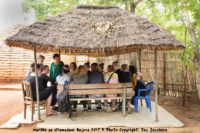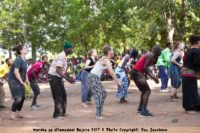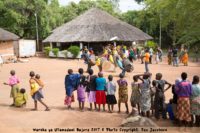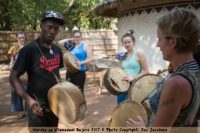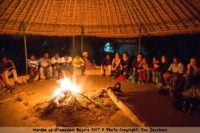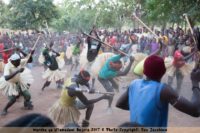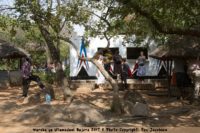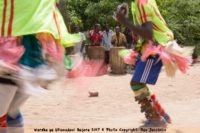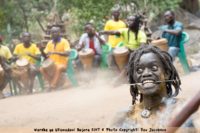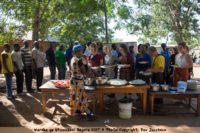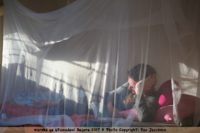A personal account from Bujora
– Habari?
– Nzuri sana.
– Karibu sana.
– Asante!
Four to five times an hour I am met with the theese greetings. Combined with a big smile, a lot of white teeths and sometimes a ’high-five’. It never seems to stop.
Everybody wants to greet you and make you feel welcome.
At many web-sites where you can read about the center near Mwanza in the north-eastern part of Tanzania, it is said, that if you are interested in sukuma-culture, you should visit Bujora.
That is not wrong. Bujora is the place for you.
But actually, you dont need to be interested in advance.
If you go there – and have no knowledge about or specific interest in sukuma-culture or the dances – your simply presence and the interaction with the people at Bujora, will make your interest grow by itself.
Trust me, I just been there for three weeks!
I was at the Bujora Cultural Center as a photographer and journalist during new year 2016/2017. I was following a group of danish people taking part in the Warsha 2017.
Even though I dont dance, even though I dont even speak the kiswahili, I felt myself warmly welcomed and taken care of.
I stayed in the ’chapel’. A room in a building where former nuns have given each room a name. My room was named ’chapel’. The whole building with around ten-twelve rooms had a lot of taps, showerheads and even toilets – but no water.
Every day a short, smiling lady – Sabina – did carry water in a bucket on her head to our building. With a straight, strong back and the bucket on top she managed to supply all of us with enough hot water for a shower every morning. If I used all the water in the morning, she made sure I had a full bucket again in the afternoon.
It compelled respect.
The 17-days program of Warsha 2017 was packed. Fully packed.
And every day was a joy.
We practised our sparse kiswahili and even learnt some few kisukuma-phrases. Mostly greetings, which we practised at every opportunity.
We had dancelessons in the tough sun, we had drumlessons, we studied kiswahili, we sang at the fire in the night, we were on trips to small villages, where they welcomed us as old friends, we were invited to a marvelous dinner at one of the organizers house and sat afterwards under the stars in a warm and cosy night, chatting and laughing, drinking a beer or a soda with our new friends.
Just to mention a few of our experiences.
All part of the warsha.
You will never be bored with sukumas inhouse!
They talk all the time, they laugh all the time, they drum all the time.
In a white bus with a steady driver going to a small village (Isesa) three-four hours away from Bujora, they drummed in the back of the bus while all of us sang all the way, and bottles of water with names like ’Jambo’ and ’Pure Life’ kept us from dehydrate in the sun.
Through the jolting ride we passed waving children, dry landscape, huge mangotrees and small towns with few shops. People all over stopped their doings staring at the bus with sukumas and wazungu and the sound of joy fleeting from the windows.
In a european context ’real happiness’ is often defined as single moments, where everything in your life is peaking at the same time, rather than a steady state you can have for days.
On that sunny day, in that particular bus, with the siging, the drumming and all the laughing my mind and body united and peaked to a level I have only experienced few times before in my entire life.
I felt deeply happy.
Thank you, Bujora. Asante sana.
Yes, we certainly had a wonderful time. But what about the main topic, the dance? The main reason why we were there. Did the participants learn anything?
When asked about that – what have you specific learned about dance during the Warsha – alle the danish participants mentioned their own body.
By watching the sukumas dance, by listening to the drums and especially by being part of the dance themselves, the participants discovered that their own body is an instrument you can tweak to a higher level. And that the higher level gives you a freedom (in the dance) we people from Europe usually dont have. One of the danish girls said: Sukumas move their bodies relaxed, informal but very controlled.
Another girl added: I learned to turn off my brain and let my body take over. And found a completely different joy of music because I could feel it.
Apart from that, the participants also mentioned the awareness of different dancestyles, in which they took part themselves: Buyeye, majembe, sogota, bunungule, bulabuka and kadum.
It is said, that great experiences demand you leave your comfort zone.
If you want an experience that will go to your heart and stay there forever, you must leave your possible fear of malaria (or take some pills), your fear of flight (its a long trip), your fear of upset stomach and all your other possible reservations.
The reward in return from the Warsha and the people at Bujora is an extraordinary adventure that will tattoo itself to your heart and 1) make you wonder why you didnt do this before and 2) give you an full-size experience you can never forget.
Prepare your camera, polish your shoes and slip your curiosity loose.
Book the flight.
It will enrich your life for good.
This article is written by Dav Jacobsen. A Danish journalist and photographer, who participated in the cultural workshop: “Warsha ya Utamaduni, January 2017”. All pictures is copyright by him.

